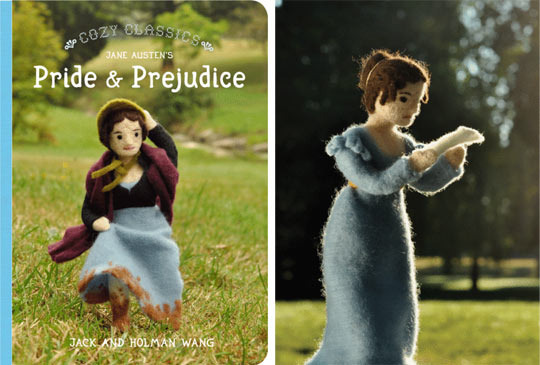Pride and Prejudice and Popcorn
It’s twenty years since the BBC’s definitive Pride and Prejudice, which launched the stellar careers of both Mr Darcy and Colin Firth, and became for many the gold standard of period drama in general, Jane Austen in particular. And it’s ten years since the ‘other’ version: the Keira Knightley one, with Matthew McFadyen as Darcy, Judi Dench as Lady Catherine, Brenda Blethyn and Donald Sutherland as the Bennets, and a then-unknown Carey Mulligan as Kitty. For ten years, prejudice prevented me from watching it, but this year, for some reason, I swallowed my pride.
To my own surprise, I enjoyed it. It has nothing like the thoroughness or the stateliness, the grace of the BBC’s, but it has pleasures of its own. For one thing, it’s seductively beautiful. It glows. Indoor scenes are rich as Dutch paintings. Outdoors - where a good deal of the action takes place - woods, meadows and rivers shimmer in gorgeous light. Visually, it’s utterly romantic. It’s also, like Dutch painting, appealingly realist. We see washing and cooking as well as talking and dancing. The family shares Longbourn with their farm animals; as Guardian reviewer Peter Bradshaw put it “there is hardly a footfall out of doors that does not dislodge a hen or a goose.” This is of a piece with the film’s generally heightened physicality. Bodies, energies, even hormones, prevail. The electricity between Darcy and Elizabeth is palpable, especially when they touch. At Pemberley, Lizzy visits a gallery not of portraits but of sculptures. It also goes at a breakneck pace. There's hardly a still moment in the entire film.
There are elements here that ring true that were missing from the BBC’s. Keira Knightley’s strikingly lovely Lizzy is youthful and playful, where Jennifer Ehle, lovely though she was, played the part too soberly. Mrs Bennet is softened here, more silly than shrewish. Rosemund Pike’s angelic Jane doesn’t require any suspension of disbelief. Rupert Friend’s Wickham is believably attractive, if a little too dangerous. David Bamber’s Mr Collins would be hard to out-do, but Tom Hollander turns in a very creditable creep.
But other things are not quite right. Lydia is played as a sweet child, rather than an obnoxious teen. Georgiana is a bubbling extrovert. Matthew McFadyen, lovely though he is, seemed more sad than proud. Bingley, for some reason, is played as a wittering fool. The Hursts, and Maria Lucas, were entirely absent. Still other things were definitely not right. Anyone who knows the period would find it jarring for Mr Bingley to pop into Jane’s bedchamber while she’s ill at Netherfield, or for Darcy to stride into Elizabeth’s to deliver his letter. Lady Catherine, oddly, shows up at the Bennets’ in the middle of the night. The scene where Lizzy accepts Darcy’s second proposal has them in their respective dressing gowns, meeting on the misty moors before breakfast. Other things feel even less true: Lizzy yelling "Leave me alone!" Charlotte Lucas yelling "Don't you dare judge me!”
These moments jar more on reflection than they do during the film. That’s because they fit into the film’s raised emotional volume, its adolescence, its romanticism. This film does for Austen what Baz Luhrmann did for Shakespeare: it brings great art to a new audience in a way that says more about the audience than the art. As a movie, it’s enjoyable, but it’s a different kind of joy from the subtler, more decorous kind Austen usually delivers. It’s as if the director, Joe Wright, found the book insufferably tedious and thought he’d like Austen infinitely better if it were louder, grittier, racier - more romantic. Much more romantic, perhaps, but not near so much like Austen.

